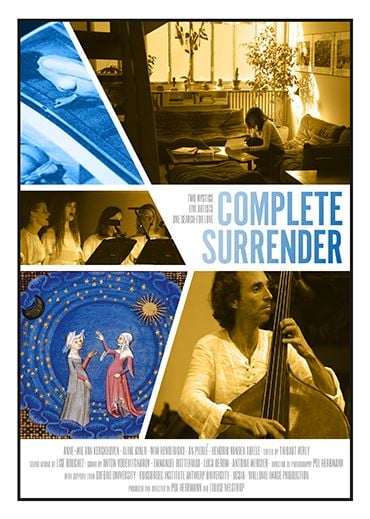‘Complete Surrender’
What can the writings of thirteenth-century female mystics teach us about love and spirituality in contemporary life? More than you might think, according to Complete Surrender, a short film produced by Oxford University’s Dr Louise Nelstrop and filmmaker Pol Herrmann.
 Complete Surrender Film Print
Complete Surrender Film Print(Credit: Katie Allen Design)
The project originally developed from Louise’s research into erotic and nuptial imagery for the Oxford Handbook of Mystical Theology. She feels that it’s important to get such theological research out of ‘dusty libraries’ into the wider world and planned the film as a vehicle to take her ideas to new audiences.
The five artists featured are: fine artist Anne-Mie Van Kerckhoven; composer Wim Henderickx; author Aline Kiner; singer-songwriter An Pierlé; and musician and composer Hendrik Vanden Abeele. Each had explored the writings of Hadewijch and Porete through their own medium – and shared their work and reflections with Nelstrop and Herrmann during filming in 2019.
‘There’s been a surge of interest in the writings of medieval female mystics from the Low Countries in the last decades,’ explains Dr Nelstrop. ‘French and Belgian speaking artists are looking to engage around the contribution of these two extraordinary women, who challenged the norms of society and were willing to die for their beliefs. The film set out to ask the question, “What is love?” building on the experience of Hadewijch and Marguerite. The artists’ conclusion was, “complete surrender” – hence the title of the film!’
‘The mystics graphically depict the relationship between spirituality and erotic love,’ continues Louise. ‘The modern world tends to see love and religion as mutually exclusive, but the mystics show they’re deeply connected, and their writing offers a richer understanding of women’s agency and sexuality than many modern narratives.
A grant from the KE Seed Fund provided initial funding for the project in 2019 whilst Louise was on sabbatical at the University of Antwerp. ‘The grant helped us access match funding from the Ruusbroec Institute in Antwerp University and St Ignatius University Centre Antwerp,’ she explains. ‘Matt Smart, who administers the Fund, also helped us shape the project and pushed us to develop an artistic documentary film rather than the traditional documentary we had first imagined – which has worked really well.’
‘We’ve been amazed at how people have responded. We were delighted to be awarded “Best Documentary” in the Love Story Film Festival (15 February 2020, London). And audiences have told us that it’s made a profound impact on them –prompting them to think differently about the relationship between spirituality and sexuality and their own relationship to both.’
The process has also affected Louise’s own research: ‘Having the privilege of working with, and listening to, the artists involved in this project has given me a new appetite to ‘listen’ – to texts, to their artistic interpreters, and to audiences. By truly listening to each other in this project, we have all heard afresh these two medieval discourses of desire.’
Dr Louise Nelstrop is a College Lecturer in Theology at St Benet’s Hall and member of the Faculty of Theology and Religion.
Funders: Oxford University Knowledge Exchange Seed Fund, Ruusbroec Institute, Antwerp University (BOF project: Medieval Mysticism and Modern Identities’, St Ignatius University Centre Antwerp (UCSIA)